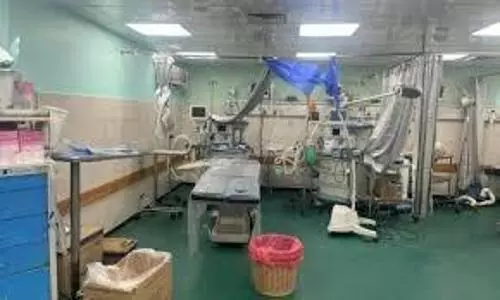
Leave vaccine to experts
text_fieldsIt is not easy to discern a purpose in the letter from Director General of Indian Council of Medical Research (ICMR) to research centres asking them to get ready a vaccine against Covid-19 by 15th August. Tests and trials are to be conducted in 12 institutions of the country, on behalf of Bharat Biotech (BB), authorised to conduct climinal tests.
What the government has to do is to give the free hand and support to the scientists working on this. But questions are now being raised about the motive behind ICMR setting an unrealistic deadline: whether it was swayed by considerations of science or politics. The letter was not sent officially by ICMR, but by its director general Balram Bhargava. When the question surfaced who set the deadline of 15 August and how, an explanation was given that it was only intended to expedite the study and avoid red tape during the trials. As a matter of fact, the area where delays occur and have to obviated, is that of administrative routes, not of research labs.
Even now, the inspections and approvals by bio-ethics committees have been completed only in a few of the 12 institutions. And then on the other hand, sufficient time has to be granted for test. Only after due observation of the result of the vaccine, its after effects and side effects through various stages, can it be determined as acceptable or not. For tests through three stages the time asked by BB is 15 months. After the efficacy of the vaccine is proved and official approval granted, it will still take another few months for actual production. When ICMR decided that by 15 August it should be ready for 'public health use', it would have meant own use by doctors. But even for accomplishing that, the crucial third phase of trial will have to be skipped. Bhargava himself should ponder whether the language of threat used in the wording "non-compliance will be viewed very seriously" will go well with the realm of scientific experiments. Overall, the inconsistency in his letter point at either of two possibilities: the haste of some quarters to produce a vaccine and capture the market for covid before any one else does; or the pressure to give an opportunity for the prime minister to make a declaration on Independence Day that we have developed a vaccine indigenously. It can be recalled that Modi's declaration on last year's I-Day about India's plan to send man to space, was declared bypassing Indian Space Research Organisation (ISRO).
What those in power should have done was not to be driven in every step by the angle of political captialisation or gain, but to allow freedom and time for scientists, at least in matters impacting public health. Administrative procedures should be completed fast – which is a call of the government. The time-lines set for researchers cannot be shrunk. It was on 29 June that BB was given approval for conducting tests of phase one and two. (Later it was granted to Zydus Cadila too). It will take months for going through the first phase of injecting vaccine on a limited number of volunteers to ensure its safety and then the second phase of replicating the same on a larger number of subjects. Even if all of this goes as planned, says the chief scientist in World Health Organisation (WHO) Soumya Swaminathan, completing the three prescribed phases will take a minimum of nine months. Would Balram Bhargava have meant that the deadline of 15 August has to be met by diluting the stipulations in the first two phases and skipping the third? If so, that will be a violation of standard procedures and protocol of WHO, and nothing short of tinkering with the health of the people. Virologists point out that even if two phases of trials are completed satisfactorily, that will not be enough to declare that a vaccine has been developed.
The disease of Covid-19 and its prevention are matters of mighty import. At the global level, the number of patients is fast approaching 1.25 Crore and deaths 5.5 lakhs. Within India, 6.75 lakh people have been infected and deaths have touched 20,000. The sooner a vaccine and treatment are developed, the better. The eagerness and anxiety to reach that stage is quite understandable, as the entire world is waiting for a preventive vaccine. But the earliest conceivable time for an efficacious vaccine to be available, according to renowned virologist Angony Fauci, will be the end of this year or early next year. One of the first likely vaccines will be the one expected to come out from the joint venture of Oxford University-AstraZeneca under US-UK co-operation. And India has reached an understanding to buy a crore doses of that once it is available. WHO has made it clear that the option of Hydrochloroquin, once thought to be effective, will not be suitable. Groups of nations are also waiting to lend manpower and financial support to the vaccine research. The US has got ready to try it for emergency use and China for use of soldiers, without waiting for official recognition. That remaining so, the scientific world is entitled to sufficient time and authority to develop a vaccine that can be used for public health purpose and to inform that to the world, a privilege that cannot be denied to them through political interference. Given the fact that no vaccine has yet been discovered for corona virus including SARS and MERS, the scientific world should also resist the attempts to put them under stress through avoidable haste. Let those who have the expertise decide matters, at least in the matter of covid prevention.























